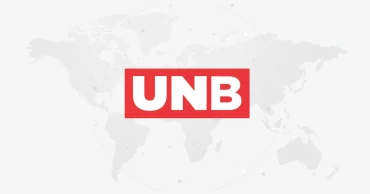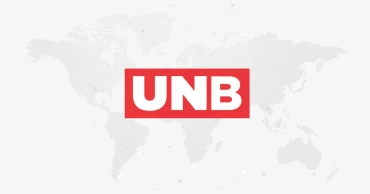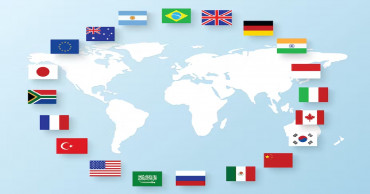G20 Presidency
At G-20, high expectations for India as rising global power
With the foreign ministers of the Group of 20 leading economies meeting Thursday in New Delhi, host India is promoting itself as a rising superpower while leveraging its position on the global stage to bridge the gap between the West and Russia.
Experts expect India to be at the center of bitter global divisions, particularly over Russia’s war in Ukraine. But it’s also an opportunity for the South Asian nation to position itself as the voice of the Global South and as a potential mediator between the West and Moscow.
Read more: Modi urges G20 foreign ministers to overcome differences
India is expected to adopt a neutral stance on Ukraine, as it has in the past. The event is likely to be overshadowed by the war in Europe and its impact on global energy and food security. However, senior foreign ministry officials said Wednesday that India was determined to focus on “equally important” issues of rising inflation, debt stress, health, climate change and food and energy security in developing nations.
“I really do believe that India stands the best chance of all countries to try to hold peace negotiations between Russia and not just the U.S., but the West, actually,” said Derek Grossman, an analyst focused on the Indo-Pacific at the RAND Corporation.
He credited India’s non-alignment and its rise as a global power for why it could be a potential peacemaker.
Read more: Modi urges G20 finance leaders to focus on ‘most vulnerable’
But the South Asian country has its own challenges, particularly with regional rival China. Tensions between New Delhi and Beijing remain high after a deadly border clash in 2020.
On Wednesday, Chinese Foreign Ministry spokesperson Mao Ning said the country’s foreign minister would be attending the G-20 meeting, and that “China attaches great importance with India.” She added maintaining good ties between the two countries is fundamental to their interests.
Prime Minister Narendra Modi and India’s Foreign Minister Subrahmanyam Jaishankar “have done a good job of steering this middle path in very turbulent times,” Grossman said.
“You now have American, Russian and even Chinese diplomats supporting India. The country really is at the geopolitical crossroads of everything now that involves the Global South,” he added.
So far, India has refrained from directly criticizing Russia. The two have been allies since the cold war era and New Delhi depends on Moscow for nearly 60% of its defense equipment. India has increasingly scooped up Russian oil since the invasion a year ago, initially facing scrutiny from the U.S. and other allies over its growing purchases. That pressure has since waned and India has continued to abstain from voting in U.N. resolutions that condemn Russia’s invasion of Ukraine.
“It may appear unfathomable to many in the West that the reaction of the world’s largest democracy to such a cold-blooded, egregious aggression would be so subdued. But for anyone who understands India’s foreign policy, it’s not surprising at all,” said Michael Kugelman, director of the Wilson Center’s South Asia Institute.
Read more: India’s Supreme Court orders investigation of Adani business group
“New Delhi has a special relationship with Moscow, and it’s not about to jeopardize it by turning on a longstanding partner,” he said.
Thursday’s meeting will nonetheless be challenging for India, especially after it was forced to issue a compromised chair’s summary at the conclusion of the G-20 finance ministers meeting last week. Russia and China objected to a joint communique that retained language on the war in Ukraine drawn directly from last year’s G-20 leaders summit declaration in Indonesia.
India has said that it stands by the Bali declaration in which major world powers strongly condemned the war in Ukraine, warning that the conflict was intensifying fragilities in the world’s economy.
Grossman said it was concerning that the final statement issued in Bengaluru last week was watered down from the Bali declaration at the insistence of China and Russia. He said New Delhi allowing that to happen was worrisome, but India’s “awkward predicament” to ensure a successful G-20 with everyone there, including Russia and China, meant the country has to make “compromises.”
“I think that’s what India is trying to do now,” he said.
The summits are particularly important for Modi and his ruling party ahead of the 2024 general elections. A strong show during India’s year as G-20 president will allow Modi’s party to signal its diplomatic reach and project power both at home and abroad.
Kugelman said the summit, due later this year, will advance important domestic political goals for New Delhi, and Modi’s ultimate goal would be to “successfully manage the myriad geopolitical rivalries within the G-20, signal that India can rise above intense great power competition and seemingly intractable issues like the Ukraine war, and guide the prestigious club toward tangible achievements.”
“In effect, Modi wants its G-20 presidency to yield meaningful achievements. That’s a tall order, for sure, but it’s important for New Delhi’s foreign policy and domestic political goals alike,” he said.
2 years ago
US supports India for G20 presidency
The United States has supported India for the G20 presidency, US Secretary of State Antony Blinken tweeted on Sunday (November 13, 2022).
India’s External Affairs Minister S Jaishankar also tweeted as the two leaders met in Cambodia on the sidelines of the ASEAN Summit in Cambodia's Phnom Penh.
Blinken said that he met Jaishankar “to discuss ongoing efforts to expand our partnership and mitigate the effects of Russia’s war on Ukraine.”
Read more: Putin won’t be at G20 summit, avoiding possible confrontation with US
“The US supports India’s G20 Presidency," Blinken continued.
He made the points along with photographs of the two leaders and hashtag - #USIndiaAt75.
Jaishankar wrote that they discussed Ukraine, Indo-Pacific, energy, G20 and bilateral relations.
The development means India will preside over the G20 Summit from December 1.
Read more: G20 Presidency: India to invite Bangladesh as guest country
Earlier this week, Prime Minister Narendra Modi unveiled the logo, website and theme of India's G20 Presidency, according to The Hindustan Times.
“Notion of universal brotherhood is being reflected via the G20 logo. The lotus in the logo of G20 is a symbol of hope in these tough times," Modi said in a virtual address.
The Hindustan Times quoted Modi as saying that that G20 Presidency is not merely a diplomatic meeting for India, but it is a new responsibility and a measure of the world’s trust in India.
Read more: G20 finance leaders in Bali to tackle Ukraine, inflation
G20 is an intergovernmental forum comprising 19 countries and the European Union. It works to address major global challenges related to economy, climate change mitigation and sustainable development.
G20 or Group of Twenty is composed of most of the world's largest economies including both industrialised and developing nations.
3 years ago
G20 Presidency: India to invite Bangladesh as guest country
India, as G20 Presidency, will be inviting Bangladesh, Egypt, Mauritius, Netherlands, Nigeria, Oman, Singapore, Spain and the United Arab Emirates (UAE) as guest countries to its meetings and Summit.
The Ministry of External Affairs, India made the announcement on Tuesday.
Read:“Bangladesh suffering from greenhouse gas impact caused by the developed world”
India will assume the Presidency of the G20 for one year from December 1, 2022 to November 30, 2023.
Under its Presidency, India is expected to host over 200 G20 meetings across the country, beginning December 2022.
The G20 Leaders' Summit at the level of Heads of State / Government is scheduled to be held on September 9 and 10 next year in New Delhi.
ISA (International Solar Alliance), CDRI (Coalition for Disaster Resilient Infrastructure) and ADB (Asian Development Bank) will also be invited as guest IOs.
In addition to G20 Members, there has been a tradition of the G20 Presidency inviting some guest countries and International Organizations (IOs) to its G20 meetings and Summit.
Regular International Organizations (UN, IMF, World Bank, WHO, WTO, ILO, FSB and OECD) and Chairs of Regional Organizations (AU, AUDA-NEPAD and ASEAN) will be joining, too.
The G20, or Group of Twenty, is an intergovernmental forum of the world’s major developed and developing economies.
It comprises 19 countries - Argentina, Australia, Brazil, Canada, China, France, Germany, India, Indonesia, Italy, Japan, Republic of Korea, Mexico, Russia, Saudi Arabia, South Africa, Turkey, UK, USA and the European Union (EU).
Collectively, the G20 accounts for 85% of global GDP, 75% of international trade and two-thirds of the world population, making it the premier forum for international economic cooperation.
Read:Bangladesh seeks additional supply of LNG to meet growing demand
India is currently part of the G20 Troika (current, previous and incoming G20 Presidencies) comprising Indonesia, Italy and India. During our Presidency, India, Indonesia and Brazil would form the troika.
This would be the first time when the troika would consist of three developing countries and emerging economies, providing them a greater voice.
3 years ago





